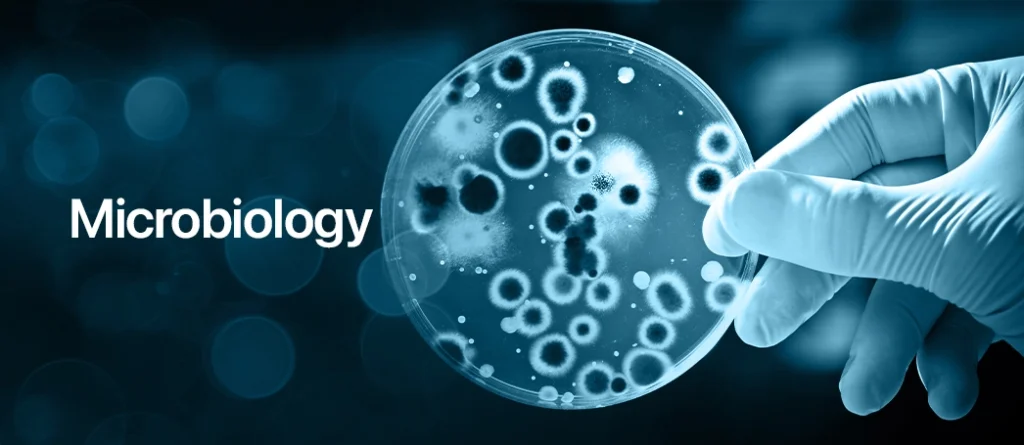Microbiology

About Courses
Immerse yourself in the fascinating realm of Microbiology with our comprehensive online course. Delve into the intricate world of microorganisms, uncovering their roles in health, disease, and the environment. Guided by expert instructors and leveraging cutting-edge educational resources, this course offers a captivating journey into the microscopic wonders that shape our world.
Importance of Microbiology: Microbiology plays a pivotal role in various fields, shaping our understanding of the microbial world and influencing advancements in science, healthcare, and beyond. Here are key points explaining the significance of microbiology:
Medical Research and Practice:
- Disease Understanding: Microbiology forms the foundation for understanding infectious diseases, aiding in the diagnosis and treatment of various medical conditions.
- Vaccine Development: Advancements in microbiological research contribute to the development of vaccines, crucial for preventing the spread of infectious diseases.
Biotechnology and Industry:
- Bioprocessing: Microbiology is instrumental in bioprocessing, where microorganisms are harnessed for the production of enzymes, antibiotics, and other valuable products.
- Genetic Engineering: Biotechnological applications, such as genetic engineering, leverage microbiological principles for modifying organisms to achieve desired traits.
Environmental Sciences:
- Ecosystem Dynamics: Microbial communities play a vital role in maintaining ecosystem balance and nutrient cycling, influencing environmental health and sustainability.
- Waste Treatment: Microbiology is integral to wastewater treatment, facilitating the breakdown of pollutants and ensuring the responsible management of waste.
Pharmaceutical Development:
- Drug Discovery: Microbiological research contributes to the discovery of new pharmaceuticals, including antibiotics and antifungal agents, essential for combating microbial infections.
Food and Agriculture:
- Food Safety: Microbiology is crucial in ensuring food safety by monitoring and controlling microbial contaminants in food production and processing.
- Agricultural Productivity: Microorganisms contribute to soil health, plant growth, and pest control, influencing agricultural productivity.
Research and Innovation:
- Scientific Advancements: Ongoing microbiological research drives scientific discoveries, contributing to advancements in our understanding of life, genetics, and evolution.
- Technological Innovations: Microbiology supports technological innovations, including the development of cutting-edge tools and techniques for research and diagnostics.
Public Health:
- Disease Surveillance: Microbiology is vital for monitoring and understanding disease trends, enabling effective public health measures and responses.
- Epidemiological Studies: Microbial studies contribute to epidemiological investigations, essential for controlling disease outbreaks.
Education and Training:
- Scientific Education: Microbiology is a cornerstone of scientific education, providing students with insights into the microbial world and fostering critical thinking.
- Professional Development: Microbiological knowledge is essential for professionals in healthcare, research, and related fields, enhancing their expertise and contributing to career development.
- Bloodstream & Cardiovascular Infections
- Gastrointestinal Tract Infections
- The Hepatobiliary System
- Skin & Musculoskeletal System Infections
- Respiratory Tract Infections
- CNS Infections
- Urinary tract Infections
- Miscellaneous Infections
- Microbial Diversity and Structure:
- Delve into the intricate world of microorganisms, unraveling their diverse forms, structures, and functions. Understand the classification and characteristics of bacteria, viruses, fungi, and protozoa. Explore the fascinating realm of microbial genetics, learning about DNA replication, transcription, translation, and the mechanisms that drive microbial diversity.
- Pathogenic Microorganisms and Disease:
- Gain insights into the fascinating interplay between microorganisms and human health. Explore the mechanisms of infection, the immune response, and the factors influencing the development of infectious diseases. Learn to identify and understand pathogenic microorganisms, their modes of transmission, and the principles of microbial control and prevention.
- Applied Microbiology and Technological Innovations:
- Uncover the practical applications of microbiology in various fields. Explore the role of microorganisms in biotechnology, food production, environmental sustainability, and pharmaceutical development. Understand how microbiological research contributes to technological innovations, including genetic engineering, drug discovery, and the development of cutting-edge tools for research and diagnostics.


